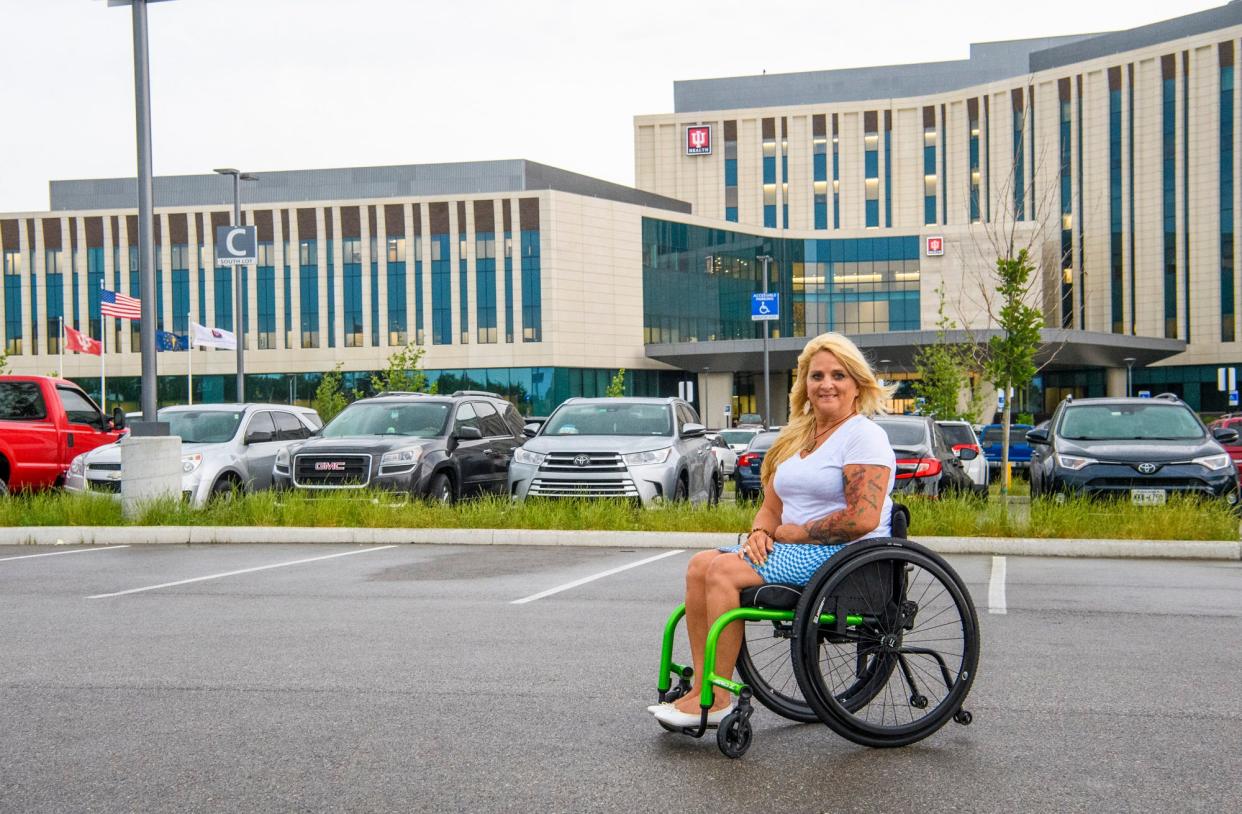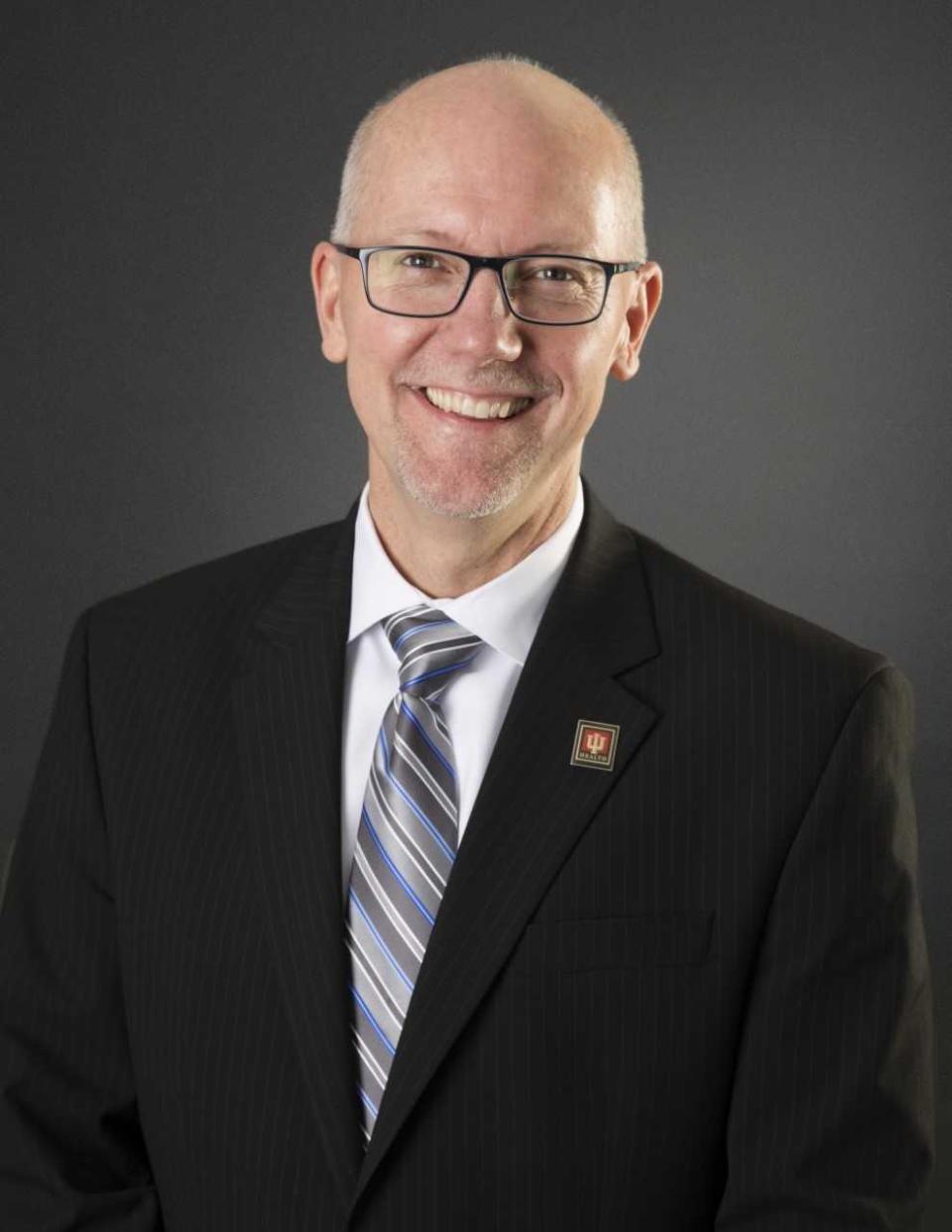'I am very satisfied': After complaint, IU Health Bloomington Hospital addresses accessibility problems

A Bloomington resident who uses a wheelchair and who late this spring filed a complaint alleging parts of the new Indiana University Health hospital were not accessible to disabled or little people said last week hospital officials have addressed most of her concerns.
“I am very satisfied,” Lesamarie Hacker said Friday.
In June, Hacker said she could not reach the soap dispensers in the women’s bathroom, utensils and napkins in the cafeteria and could not even get food there because she could not touch most of the iPads people use to place their orders.
FOR SUBSCRIBERS:Man accused of raping IU student who died was on trial for murder in 2010
Hacker, who volunteers at the $557 million facility that opened last winter, said despite months of complaints to supervisors and even the health system’s south central region president, Brian Shockney, the problems persisted. She filed a complaint with the city of Bloomington and alerted The Herald-Times.

Hacker said Friday within days of the story being published in the newspaper, hospital officials began to address her concerns.
Accessibility problems at hospital:Bloomington resident questions whether new $557M hospital violates accessibility laws
She said about three days after the article appeared, the iPad in the cafeteria was lowered and condiments placed on a smaller table within reach of wheelchair users.
While those actions may seem small to able-bodied people, Hacker said they mean a lot to disabled and little people.
“I was in tears the first time I could order my own food," she said.
One person to whom she had complained about not being able to reach the iPad suggested Hacker simply ask other people for help. For Hacker, the suggestion served as an example of an all-too-common and frustrating experience in which able-bodied adults infantilize disabled people, especially when state and federal laws exist to prevent precisely those kinds of situations.
Hacker said hospital officials also have lowered the soap dispensers in the bathrooms so that she can now reach them. The Centers for Disease Control and Prevention emphasizes the importance of proper hand hygiene in health care facilities to prevent the spread of diseases such as flu and COVID-19.
Hacker said hospital officials also have fixed malfunctioning automatic doors that made it difficult for her and others to access some hospital areas.
She said she recently met with IU Health leaders, including Shockney and an IU Health attorney, and said they have made good progress and plan to continue to address accessibility problems.
Hacker said she pushed back when hospital officials accused her of disparaging the hospital in the media.
“I was telling our community what I thought they needed to know,” she said.
Hacker said she loves volunteering at the hospital and has has gotten positive feedback from hospital patients and employees for making her complaints heard.
“That’s all been … a very positive change,” she said.
However, she questioned why it took months of complaints for hospital leaders to respond.
“It’s sad … that I had to bring it to the media’s attention to be fixed,” Hacker said.
IU Health declined to comment for this story.
IU Health gives $400M to IUIU Health has given money to IU before — but never this much, and never like this
Michael Shermis, special projects coordinator with the city’s Community and Family Resources Department, said he, too, along with city legal staff met with Shockney and other IU Health officials in mid-August.
“We were happy that it seems this situation is resolved,” Shermis said via email.
Robin Jones, director of the Great Lakes ADA Center, previously said Hacker’s problems are, unfortunately, not unusual.
Jones said state and federal laws contain precise language, down to the inch, about how facilities must assure accessibility. However, she said, disabled people often experience challenges because builders, designers and architects forget or neglect to consider that door handles, dispensers or swiping mechanisms may be out of reach even when the facilities comply with minimum standards required by law.
“We never recommend that an entity mount their dispensers to the maximum height since there are many people who will still have difficulty using it at the maximum height,” she said. “We recommend that they consider their population/audience and mount their dispensers below the maximum height to assure a wider (number) of people can use them.”
Contact reporter Boris Ladwig at bladwig@heraldt.com.
This article originally appeared on The Herald-Times: IU Health Bloomington Hospital addresses accessibility problems

